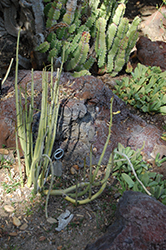Fri & Sat 8am - 8pm
Sun 8am - 7pm
Anytown, USA 12345
fax: 261.787.0463
e-mail: info@successgc.com


Plant Finder

Height: 3 feet
Spread: 18 inches
Sunlight:
![]()
![]()
Hardiness Zone: 9b
Other Names: syn. Ceropegia aphylla
Description:
An upright, succulent shrub with smooth, jointed, pale green stems that branch upward from the base; narrow leaves atop the stems appear in fall and winter, along with interesting yellow blooms; an excellent rock garden or container specimen plant
Ornamental Features
Cardoncillo is a highly distinctive and unusual plant. Although it actually isn't technically a cactus, it is still a succulent evergreen which behaves much like a cactus. It is characterized by the highly modified and distinctive smooth cylindrical grayish green stems that comprise the bulk of the plant, and which are designed to retain water for extended periods of time. It has dark green evergreen foliage. The small succulent narrow pinnately compound leaves remain dark green throughout the winter. This plant has yellow tubular flowers at the ends of the branches from late fall to mid winter, which are interesting on close inspection.
Landscape Attributes
Cardoncillo is an unusual succulent evergreen plant with a columnar habit of growth. It commonly grows as a shrub-like plant with multiple 'branches' and stems. Unlike a cactus, which this plant resembles, it does have foliage, but it's the smooth grayish green narrow cylindrical segments that are of primary interest from a landscape or garden perspective.
This is a relatively low maintenance shrub, and should not require much pruning, except when necessary, such as to remove dieback. It has no significant negative characteristics.
Cardoncillo is recommended for the following landscape applications;
- Mass Planting
- Rock/Alpine Gardens
- Border Edging
- General Garden Use
- Container Planting
Planting & Growing
Cardoncillo will grow to be about 3 feet tall at maturity, with a spread of 18 inches. It tends to fill out right to the ground and therefore doesn't necessarily require facer plants in front. It grows at a slow rate, and under ideal conditions can be expected to live for approximately 20 years. As this plant tends to go dormant in summer, it is best interplanted with late-season bloomers to hide the dying foliage.
This shrub does best in full sun to partial shade. It prefers dry to average moisture levels with very well-drained soil, and will often die in standing water. It is considered to be drought-tolerant, and thus makes an ideal choice for a low-water garden or xeriscape application. Like most succulents and cacti, this plant prefers to grow in poor soils and should therefore never be fertilized. It is not particular as to soil pH, but grows best in sandy soils. It is somewhat tolerant of urban pollution. This species is not originally from North America. It can be propagated by cuttings.
Cardoncillo makes a fine choice for the outdoor landscape, but it is also well-suited for use in outdoor pots and containers. With its upright habit of growth, it is best suited for use as a 'thriller' in the 'spiller-thriller-filler' container combination; plant it near the center of the pot, surrounded by smaller plants and those that spill over the edges. It is even sizeable enough that it can be grown alone in a suitable container. Note that when grown in a container, it may not perform exactly as indicated on the tag - this is to be expected. Also note that when growing plants in outdoor containers and baskets, they may require more frequent waterings than they would in the yard or garden.
